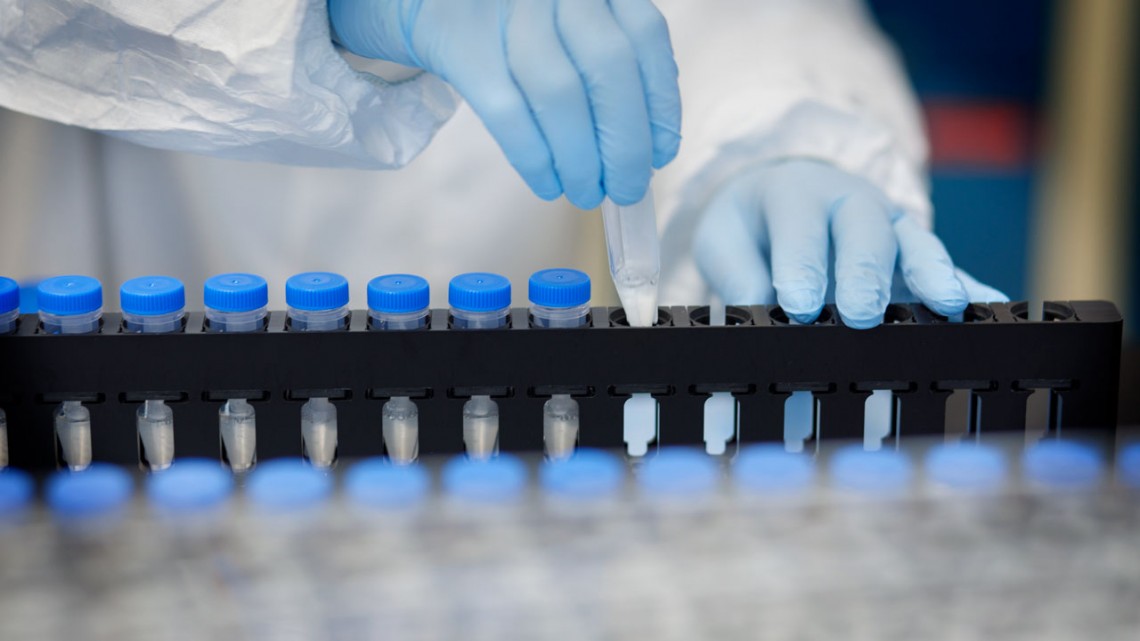
The Cornell COVID-19 Testing Laboratory at the College of Veterinary Medicine.
‘Adaptive testing’ quickly IDs infections within social circles
By Melanie Lefkowitz
To proactively identify cases across campus and slow the spread of COVID-19, Cornell is testing everyone in the social circles of people infected with the virus, in addition to those who meet the definition of close contacts.
The aggressive approach, known as adaptive testing, has already identified cases in a recently discovered cluster that would have otherwise gone undetected.
“We want to go that extra step and identify individuals who might not be close contacts by the formal definition, but who we think are part of a community that might be at risk,” said Gary Koretzky, vice provost for academic integration and professor of medicine at Weill Cornell Medicine. “If they are in fact positive, they can get the care they need and they’ll also be less likely to spread the disease.”
Adaptive testing supplements other efforts, including campuswide surveillance testing, which began Sept. 3 and includes twice-weekly tests for undergraduates and weekly tests for graduate students, in order to quickly identify cases among people who may be asymptomatic. Cornellians can also be tested if they have symptoms of COVID-19.
When a COVID-19 case is confirmed, the Tompkins County Health Department interviews the infected individual to identify close contacts – those who were within 6 feet of the infected person for at least 10 minutes beginning two days before either illness onset, or the date of testing, for those without symptoms. These close contacts are then notified, provided quarantine accommodations if needed, and tested.
Adaptive testing – which began in mid-August and is conducted in partnership by Cornell Health and the Cornell COVID-19 Testing Laboratory – further expands that group of contacts to include the infected person’s circle. The social circle – which might include residence or affinity group membership – will depend on each person’s individual circumstances.
“The way that you end transmission is by doing enough testing so you break the chain, so people who are positive are isolated before they have the opportunity to transmit the virus to others,” Koretzky said.
Contact tracing is effective in finding infections and slowing the virus’s spread, and requires infected people to work with contact tracers to identify where they went and everyone they were in close contact with during the infectious period. Adaptive testing is designed to help identify anyone an infected individual may have infected, including someone who doesn’t meet the definition of a close contact.
“The first reason to expand the circle of contacts is to find cases among people who were not identified as close contacts,” said Peter Frazier, associate professor of operations research and information engineering in the College of Engineering, whose team helped develop the approach. “Maybe the person you identify by expanding the circle did not come into close contact, but was infected by someone else because the virus is already spreading in that group. Each of those contact traces takes time, and time is of the essence when someone is walking around infectious.”
The county health department is kept informed of the additional testing, which is conducted seven days a week by Cornell Health, Koretzky said.
The plan is based on a study by Frazier’s team assessing the impact of frequently testing all students who are often in proximity to someone who tests positive – such as everyone on a residence hall floor, for example, or all the residents of a sorority or fraternity house.
While adaptive testing yielded positive results in the cluster, in other cases the additional people tested were all negative, Koretzky said.
“It’s better to test and not find positives than not to test,” he said. “This is an add-on to what we already hope and believe is a very vigorous and rigorous testing program. We’re committed to continuously thinking about different ways to do things that might afford greater protection to the community.”
Media Contact
Get Cornell news delivered right to your inbox.
Subscribe
